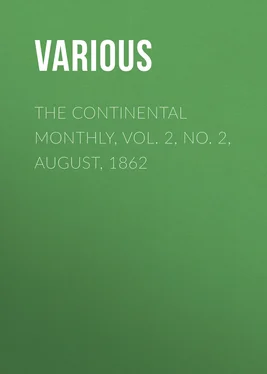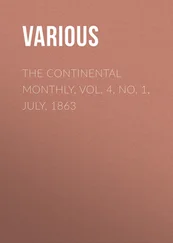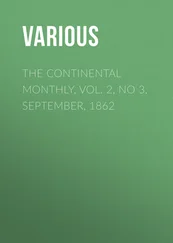Various - The Continental Monthly, Vol. 2, No. 2, August, 1862
Здесь есть возможность читать онлайн «Various - The Continental Monthly, Vol. 2, No. 2, August, 1862» — ознакомительный отрывок электронной книги совершенно бесплатно, а после прочтения отрывка купить полную версию. В некоторых случаях можно слушать аудио, скачать через торрент в формате fb2 и присутствует краткое содержание. Жанр: foreign_antique, periodic, Языкознание, Политика, foreign_edu, на английском языке. Описание произведения, (предисловие) а так же отзывы посетителей доступны на портале библиотеки ЛибКат.
- Название:The Continental Monthly, Vol. 2, No. 2, August, 1862
- Автор:
- Жанр:
- Год:неизвестен
- ISBN:нет данных
- Рейтинг книги:4 / 5. Голосов: 1
-
Избранное:Добавить в избранное
- Отзывы:
-
Ваша оценка:
- 80
- 1
- 2
- 3
- 4
- 5
The Continental Monthly, Vol. 2, No. 2, August, 1862: краткое содержание, описание и аннотация
Предлагаем к чтению аннотацию, описание, краткое содержание или предисловие (зависит от того, что написал сам автор книги «The Continental Monthly, Vol. 2, No. 2, August, 1862»). Если вы не нашли необходимую информацию о книге — напишите в комментариях, мы постараемся отыскать её.
The Continental Monthly, Vol. 2, No. 2, August, 1862 — читать онлайн ознакомительный отрывок
Ниже представлен текст книги, разбитый по страницам. Система сохранения места последней прочитанной страницы, позволяет с удобством читать онлайн бесплатно книгу «The Continental Monthly, Vol. 2, No. 2, August, 1862», без необходимости каждый раз заново искать на чём Вы остановились. Поставьте закладку, и сможете в любой момент перейти на страницу, на которой закончили чтение.
Интервал:
Закладка:
The person who, both from the position he held in the Senate and from his imposing personal appearance, first attracted the attention of the visitor, was the Vice-President, Breckinridge, of Kentucky. His later treachery has made him justly the object of bitter popular odium, inasmuch as his delinquency was aggravated by his former professions of loyalty. It was hoped by many who had witnessed his early elevation to the highest dignities, his undoubted ability both as an orator and as an administrative officer, and his apparently manly and ingenuous bearing, that talents which promised to be of so great service to his country would, in the approaching struggle, be exerted in behalf of its entirety and honor. Southern 'chivalry' in him was exhibited in a nobler and more amiable light than in his more petulant and less generous colleagues. A certain graceful dignity was united with the most attractive felicity of manner, and one could not help regarding him, when viewed in private society, as a perfect model of a gentleman. His courtesy and delicacy were exhibited to all alike, and strangers could not help admiring one who had at so early an age been raised to so giddy a hight, and yet who had retained such condescension of manner and such continual good-nature to every body who approached him. His personal appearance, as we have already said, was highly imposing; in which was combined a manliness of demeanor and a strikingly handsome countenance and figure. His peculiar fitness as a presiding officer made him popular in that capacity. Seldom, indeed, has a Vice-President occupied the chair with such perfect ease and such stately dignity. His oratory was worthy of a Senator, elevated, earnest, and partaking less of passion and rancor than other Southern speakers; but it rather lacked the substance and solidity which a maturer stage of life would undoubtedly have given to it. He seemed to be a fair representative of the Kentucky aristocracy, possessing a delicate sense of honor, a bold spirit, though hardly enthusiasm of soul. Evidently absorbed in a selfish ambition for power, this fault is in some degree palliated by the circumstance of the early age at which he was promoted to the public counsels. That this passion, unduly encouraged, has led him into a deplorable and fatal mistake, is now evident; and from what we have recently heard of him, we doubt not that a similar conviction has made him wretched and desperate.
The father of the Senate, Mr. Crittenden, so well known during the last weeks of his term as the would-be pacificator, by compromise, of the impending rupture, was the last of the generation of statesmen of whom Webster and Clay were the leading cotemporaries. His long service in the national legislature procured him on all occasions a respectful and attentive hearing, and were it not for this circumstance, the earnest impressiveness of his declamation, at times relieved by sparks of old-fashioned wit, would have attracted the notice of his auditors. He was singular in his personal appearance, and a peculiarly fierce expression of face frequently gave an erroneous idea of his character, which was, making allowance for age and a life of turmoil, affable and good-natured. He always reminded us of the portraits of Lord Chancellor Thurlow, whose bushy eyebrows and stern countenance used to terrify young barristers in Westminster eighty years ago. Rather negligent in his dress, and far from elegant in manner, he would hardly be noticed at first as one of the leading members of the body. As a lawyer, he has been acute and learned; as a statesman, generally able, though hardly profound; as an orator, not graceful, but forcible and earnest. His patriotism was, no doubt, zealous and entirely disinterested; but certainly ill-directed, and not adapted in the application it made of principles to the exigencies of the times. Representing the most respected and most prosperous of slave States, and being considered in a manner as the statesman upon whose shoulders had fallen the mantle of the illustrious Clay, his influence was considerable, both with adherents and antagonists.
With sincere satisfaction, we turn to contemplate the character of a true-hearted and undaunted Southern patriot, Andrew Johnson, of Tennessee. Coming as he did from a section in which secessionism predominates, and representing a mercurial and sensitive people, he stood out fearlessly and zealously in behalf of the maintenance of the Union at all hazards. He is an admirable example of the self-made man, having received no education in his youth, and owing to the application of maturer years the historical and political information he now possesses. Born and bred among the lower classes of society, and engaging in an occupation suited to his humble sphere, by perseverance and patience and a very superior natural ability, he has won a deserved place in the United States Senate. He is universally considered as one of the leading intellects in that body, and by his speeches during the last Congress, in which his enthusiasm as a patriot lent brilliancy and energy to his naturally forcible declamation, he attracted to himself the confidence and affection both of his auditors and of the country. His personal appearance is rather ordinary, not at all imposing, and yet his countenance indicates a sound judgment and a pure heart. His whole manner is open and frank, his bearing that of a gentleman by nature, and socially he is universally liked. His oratory is also of an ingenuous character, calculated to impress one at once with his thorough honesty and humanity. Sometimes he rose to admirable passages of virtuous indignation and scathing rebuke, as he warmed with the subject of Southern delusion, actuated by unprincipled leaders, and few of the Senators who sat on the Democratic side escaped from his truly formidable denunciation. Lane, of Oregon, a compound of conceit, ridiculous ignorance, and servility to Southern masters, was totally annihilated by the sturdy Tennesseean, for his imbecile attempts to excuse his pusillanimous submission to his chivalrous dictators. So successful was he in conjecturing and exposing the designs of the malcontent Senators, that the boldest of them feared to meet him in forensic discussion, and recoiled from the honesty and acuteness of one who knew them and did not hesitate to hold them up to ignominy. Through all the dangers which have beset the neighborhood from which he came, he has stood firm in the assertion of patriotic principles; nor to save his own household from disaster, has he yielded a jot to the demands of traitor tyrants. At present, he is provisional Governor of Tennessee, and is doing good service in bringing that once-honored State back to the folds of the Union. Of few public men can we say, what may be confidently said of him, that he has shown himself ready to sacrifice every private interest to subserve the interests of his country, and has given us a certain and practical example of a heroism unknown before the present crisis to Americans, except in the colored narratives of history.
Senator Green, of Missouri, was justly regarded as one of the clearest thinkers and speakers in the Upper House. Irregularity of life had somewhat blunted what must once have been a very superior mind. His statesmanship was of a high order; his oratory ingenuous, generally courteous and conciliatory, and always entertaining, from its lucidness and keenness. He was decidedly popular in social circles, genial and good-natured, and full of animal spirits. His excesses, indeed, rather tended to make him the more companionable, though they undoubtedly undermined an uncommonly fine intellect; and certainly nothing can be more sickening than to see one so highly endowed, and who might command the applause of listening senates, gradually sinking below the level of manhood by habitual indulgences. In personal appearance, he was rather awkward, of an ungainly figure, his countenance not highly intelligent, but cheerful and rather pleasing. After the ostracism of the great bulwark of Democracy, Douglas, from the councils of his party, Senator Green became the leader of that side of the house, assuming the place on the Committee on Territories made vacant by the Illinois statesman. As a manager of party tactics, and as a bold, shrewd, and energetic leader, few could equal and none surpass him. His rise to so high a consideration among his political friends was rapid, but proved, in the event, well deserved.
Читать дальшеИнтервал:
Закладка:
Похожие книги на «The Continental Monthly, Vol. 2, No. 2, August, 1862»
Представляем Вашему вниманию похожие книги на «The Continental Monthly, Vol. 2, No. 2, August, 1862» списком для выбора. Мы отобрали схожую по названию и смыслу литературу в надежде предоставить читателям больше вариантов отыскать новые, интересные, ещё непрочитанные произведения.
Обсуждение, отзывы о книге «The Continental Monthly, Vol. 2, No. 2, August, 1862» и просто собственные мнения читателей. Оставьте ваши комментарии, напишите, что Вы думаете о произведении, его смысле или главных героях. Укажите что конкретно понравилось, а что нет, и почему Вы так считаете.












